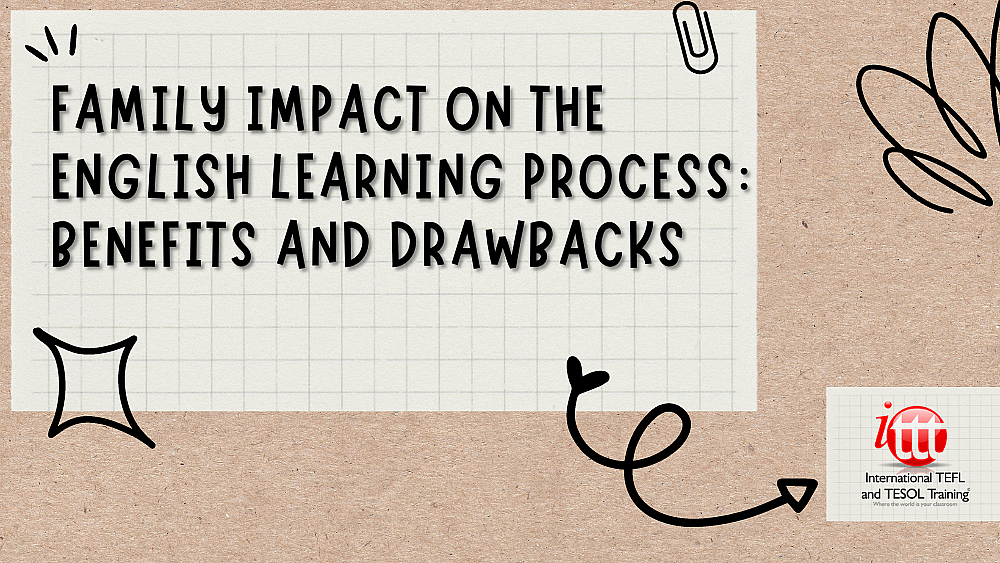Family Impact on the English Learning Process: Benefits and Drawbacks

Family Impact on the English Learning Process: Benefits and Drawbacks
Parents are the initial educators in every child's life. Their involvement significantly influences a child's success in school, leading them toward a life enriched with knowledge. Parents demonstrate to children how to develop independence and grow into polite, well-rounded individuals.
Table of Contents
Spending quality time with the child
Transition into the teenage period
What should parents look for?
Introducing children to basic household tasks at a young age, such as gardening, cooking, and cleaning, is beneficial as it instils a sense of responsibility and a desire to learn new skills. The most effective way to teach these tasks is by involving children in the process, demonstrating through example and guidance. By engaging in these activities together, parents can set a practical foundation for their children's development.
As children progress through their school years, they need support to navigate the challenges of education and social interaction. Research indicates that early elementary school years are particularly critical for parental involvement. Providing children with opportunities to explore their interests and develop essential skills sets them on a path towards future success. Additionally, fostering friendships and social connections is vital for their adaptation to the social world. While parents cannot choose their children's friends, they can lead by example, demonstrating appropriate behaviour and supportive attitudes that promote healthy relationships beyond the classroom.
Parents Achievements
From teaching their children basic skills like using a spoon, saying words, walking, and counting, parents demonstrate their dedication and hard work. Despite busy schedules, good parents prioritise their children's education, often sacrificing their own needs to provide for them. While they may not always have ample time to dedicate to teaching, they invest in their children's education by working hard and, if possible, hiring help. Although passive involvement in parenting is common, the willingness to invest financially is commendable. Ultimately, what matters most is a parent's willingness to support their child's education, whether through direct involvement or financial means. While nobody is perfect, every parent has the opportunity to become an ideal caregiver, regardless of their educational background. It may take time to navigate the complexities of parenting, but with dedication, anyone can provide valuable guidance and support to their children.
Spending quality time with the child
The ability to spend quality time with a child hinges on various factors. When both parents work to support the family financially, finding adequate time for the child may prove challenging. Conversely, if one parent is primarily responsible for earning, the other may have more opportunities to engage in educational activities with the child, which can significantly influence the child's learning.
Adequacy of resources
Families that invest their time and use quality materials at home reap the rewards. High-quality teaching materials play a pivotal role in enhancing a child's learning experience in acquiring the English language. Well-designed materials tailored to the child's level of proficiency and learning style can make learning more engaging and effective. Clear explanations, visually appealing graphics, interactive activities, and authentic language examples can stimulate curiosity and foster comprehension. Quality schools can provide materials or a list of preferred materials to students' families.
Vision and commitment
The vision and commitment of parents play a crucial role in shaping a child's educational journey. Families are well-placed to understand the child's interests and provide support in those areas. Conversely, parents lacking education or financial resources may struggle to prioritise their child's interests, potentially hindering their educational development.
In cases where financial resources are abundant but parental involvement is lacking, external support may be sought to nurture the child's interests and educational goals.
Transition into the teenage period
Families may find it more difficult to assist their child's language growth as they age. In the adolescence period, when children listen to their parents less, parents must remain supportive and patient. Parents should continue to be involved in their child's schoolwork and ensure that they are engaged in their education. It's vital that children enjoy the learning process.
As an educator
As an educator, it's crucial to engage parents in discussions about their role in the language learning process. A casual conversation can prompt parents to contribute to specific aspects of their child's learning journey or gain a clearer understanding of how their involvement can enhance their child's development in certain areas.
The final word
It isn't easy to figure out what role parents play in their children's education but it is evident that this role is enormous. Parents who think that education only needs to be provided in educational establishments, make a big mistake. Parents must take part in their children's lives. Only then will they do well at school and develop as worthy personalities.
Are you ready to teach English abroad or online?APPLY NOW & GET CERTIFIED TO TEACH ENGLISH ABROAD!Email [email protected] or use the 'contact us' page to discuss our courses and teaching English internationally!



